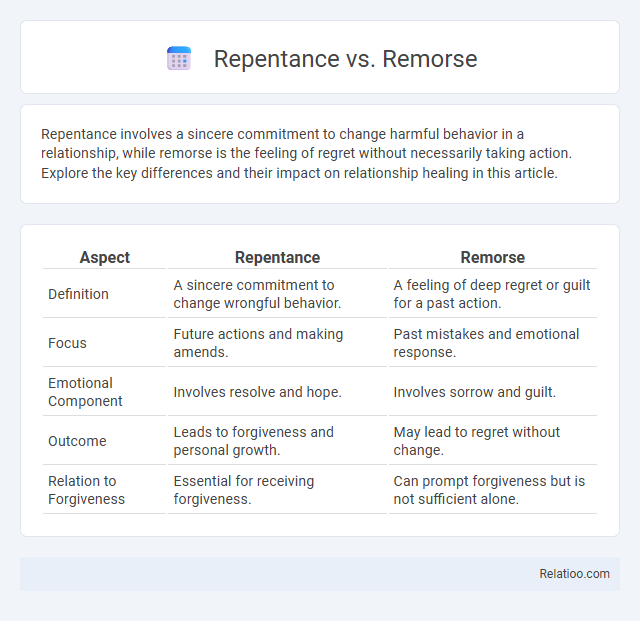Repentance involves a sincere commitment to change harmful behavior in a relationship, while remorse is the feeling of regret without necessarily taking action. Explore the key differences and their impact on relationship healing in this article.
Table of Comparison
| Aspect | Repentance | Remorse |
|---|---|---|
| Definition | A sincere commitment to change wrongful behavior. | A feeling of deep regret or guilt for a past action. |
| Focus | Future actions and making amends. | Past mistakes and emotional response. |
| Emotional Component | Involves resolve and hope. | Involves sorrow and guilt. |
| Outcome | Leads to forgiveness and personal growth. | May lead to regret without change. |
| Relation to Forgiveness | Essential for receiving forgiveness. | Can prompt forgiveness but is not sufficient alone. |
Defining Repentance and Remorse
Repentance involves a genuine commitment to change one's behavior and make amends for past wrongs, reflecting a deep moral and spiritual transformation. Remorse is an emotional response characterized by regret and sorrow for having caused harm, often without the intention or action to correct the wrongdoing. Understanding the distinction between repentance and remorse is crucial for personal growth, as repentance drives corrective action while remorse primarily highlights emotional awareness of guilt.
Key Differences Between Repentance and Remorse
Repentance involves a sincere commitment to change behavior and seek forgiveness, while remorse primarily reflects feelings of guilt or sorrow over a wrongdoing. Unlike remorse, which is an emotional response, repentance includes actionable steps towards making amends and preventing future offenses. Understanding these distinctions highlights how repentance fosters personal growth and reconciliation, whereas remorse may remain a passive emotional state.
The Emotional Roots of Remorse
Remorse originates from a deep emotional recognition of wrongdoing, involving feelings of guilt and sorrow that motivate personal accountability and change. Unlike repentance, which emphasizes the intention to correct and seek forgiveness, remorse centers on the emotional weight and moral distress caused by one's actions. Understanding remorse's psychological roots reveals its crucial role in ethical behavior and emotional healing, distinguishing it from more cognitive or action-oriented processes like repentance.
The Transformative Power of Repentance
The transformative power of repentance lies in its ability to inspire genuine change through sincere acknowledgment of wrongdoings and a commitment to amend behavior, distinguishing it from mere remorse, which involves regret without action. Unlike remorse, repentance encompasses a proactive step toward self-improvement and reconciliation, fostering personal growth and spiritual renewal. This process redefines one's path by replacing guilt with constructive responsibility, ultimately leading to lasting inner peace and ethical living.
Psychological Impacts of Repentance vs Remorse
Repentance involves a conscious decision to change behavior and seek forgiveness, which promotes psychological healing and reduces guilt by fostering personal growth. Remorse primarily triggers emotional distress and regret without necessarily leading to behavioral change, often causing ongoing negative self-reflection and anxiety. You can experience significant mental health benefits by embracing repentance, as it supports constructive coping mechanisms and emotional resilience.
Cultural Perspectives on Repentance and Remorse
Cultural perspectives on repentance and remorse reveal distinct interpretations and practices rooted in societal values and religious beliefs worldwide. In many Eastern cultures, repentance often involves communal rituals and the restoration of social harmony, while remorse is viewed as a deeply personal emotional response without necessarily requiring formal acts of restitution. Your understanding of these concepts can be enriched by recognizing how different cultures emphasize either public acknowledgment and forgiveness or private reflection and emotional sincerity in processing wrongdoing.
Repentance in Religious and Spiritual Contexts
Repentance in religious and spiritual contexts involves a profound transformation of the heart and mind, signifying sincere regret for sins and a commitment to change behavior aligned with divine principles. Unlike remorse, which is often an emotional response to wrongdoing, repentance requires actionable steps toward forgiveness and spiritual renewal. Understanding your path to repentance can deepen your faith and foster a stronger connection with your spiritual beliefs.
The Role of Accountability in True Repentance
True repentance involves a deep sense of accountability where you acknowledge your mistakes and commit to genuine change rather than mere remorse or regret. Remorse often centers on feeling sorry for the consequences, while accountability requires owning your actions and taking responsibility for making amends. This active acceptance of responsibility distinguishes true repentance as a transformative process essential for personal growth and healing.
Moving Beyond Remorse to Lasting Change
Repentance involves a sincere commitment to change one's behavior, moving beyond mere remorse, which is simply feeling regret or sorrow for past actions. True repentance requires acknowledgment of wrongdoing, a heartfelt apology, and concrete steps to correct the behavior, leading to ongoing transformation. Emphasizing accountability and proactive measures ensures lasting change rather than temporary emotional responses.
Repentance vs Remorse: Which Leads to Personal Growth?
Repentance involves a sincere commitment to change one's behavior after recognizing wrongdoing, while remorse is an emotional response characterized by guilt or regret without necessarily prompting action. Your personal growth is more significantly fostered through repentance, as it includes taking responsibility and making conscious efforts to improve and rectify mistakes. Understanding this distinction helps you transform regret into meaningful change rather than remaining stuck in feelings of guilt.

Infographic: Repentance vs Remorse
 relatioo.com
relatioo.com